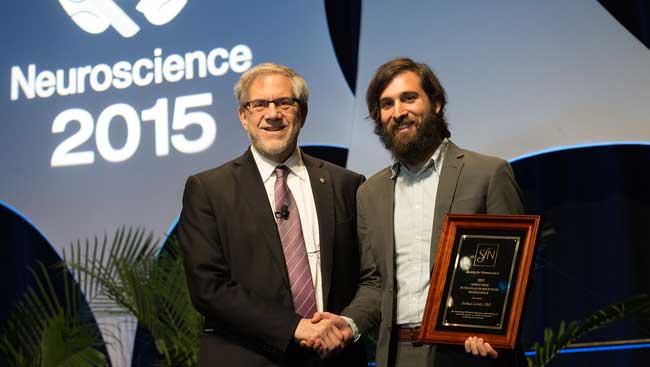
This resource was featured in the NeuroJobs Career Center. Visit today to search the world’s largest source of neuroscience opportunities.
Joshua Levitz has developed new approaches to study G protein-coupled receptors, a type of receptor found in cell membranes. He created a method to manipulate the activity of these receptors with synthetic chemical photo-switches. Levitz's work will affect the study of brain circuitry, including circuits involved in depression, and our understanding of the molecular basis of G protein-coupled receptor signaling. For these accomplishments, Levitz received the Nemko Prize in Cellular or Molecular Neuroscience in 2015. Here, he discusses his research and other topics.
What was it like creating new approaches in your research? What character traits did you rely on to keep moving your work forward?
For me, the key to tool development is maintaining as interdisciplinary a perspective as possible. The general idea is that you're going to be able to bring something from one field into a new context, often moving from a more biophysical concept into a physiological setting. At the same time, one must have a good understanding of the applications for which their prospective tool would be most valuable so they can anticipate the technical hurdles that must be overcome. For these reasons, the key to developing a tool that's useful is being able to move between a number of different fields in a fluid way and to constantly refine your approach to suit its application.
I think the same traits that allow one to succeed in any type of research are especially true in tool development. The key is to maintain a good balance between having the perseverance to make something work and honesty about whether the approach you have chosen is actually going to work — so knowing when to drop something and pivot is crucial.
I think it's also really important in tool development to be honest about when more traditional approaches work and to not be dismissive of the classical methods. There is always a trade-off for any given tool, and awareness of these shortcomings will allow one to choose and harness them most effectively.
Ultimately, what do you hope to accomplish with your research?
I'd like to understand more deeply how specific signaling molecules — in particular G protein-coupled receptors and ion channels — contribute to brain function at all levels ranging from synaptic transmission to behavior. This means integrating mechanisms from molecular, cellular, and circuit levels, and using them to ultimately gain a deeper understanding of the pathophysiology and treatment of neuropsychiatric disorders.
While earning your PhD, you took the time to teach and mentor. What did you learn from those experiences?
Teaching was really crucial for widening my view and reminding me to stay broad in my assessment of biology and neuroscience. It allowed me to reconnect with broader principles of biochemistry and molecular biology, rather than the really focused, specific problems within my research. This let me find interesting parallels, understand more about biology history, and forced me to think about the relevance of my work beyond a narrow subfield. On a more practical level, teaching also made me much better at presenting and contextualizing my work for a diverse audience.
Both mentorship and teaching have made me feel more connected to the broader scientific community because they reinforce that science is driven by a continuum of students ranging from undergraduates to grad students to postdocs. It gives you a little perspective that the scientific universe is quite vast, and you're really part of a larger endeavor of people working with overlapping goals, which can be very inspiring.
What was transitioning from graduate student to postdoc like for you?
It was very painless because I stayed primarily in the same lab and merely took on another mentor. This transition has allowed me to extend the work that I started during my PhD and to expand into a number of inter- and intra-lab collaborations. By collaborating on a number of different aspects of GPCR and ion channel signaling, I've been able to enhance the impact of my work and tackle more problems at once.
Do you have any advice for other neuroscientists in the early stages of their careers?
On an intellectual level, I think it's very important to try to balance diving deeper and deeper into some specific phenomenon and broadening one’s perspective at the same time to find more context for your work. In my case, I've continued to go deeper into the nitty gritty of molecular biophysics of glutamate receptors, but I've tried to balance that with expanding into the disease relevance of these receptors to understand them in the broader circuit context.
It's also important at all stages of your career to be very open to collaboration and take on new projects that come your way, even if they are not what you would have necessarily gravitated to in a vacuum. Especially when you're young, it is important to avoid being judgmental of other areas or levels of study. In the molecular neuroscience world, it becomes easy to have a form of what I call “molecular chauvinism,” where you're very dismissive of behavioral or systems neuroscience. At the other end, if you're working at those higher order levels, to stay aware of the underlying molecular mechanisms also seems invaluable. Ultimately, I think people who can integrate findings between these different levels are going to be the most successful neuroscientists.
Another key at early stages of one’s career is to constantly seek advice, on both the scientific and career levels, from as broad of sources as possible. At the same time, you have to develop your own point of view and make your own decisions and be a little bit weary of unsolicited advice.
Speaker



.png?h=1763&w=3125&la=en&hash=B2439C2768576BED6405672E5CD5CF8CB1AA375F)




